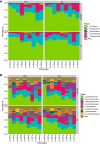Gut microbiota and glucometabolic alterations in response to recurrent partial sleep deprivation in normal-weight young individuals
- PMID: 27900260
- PMCID: PMC5123208
- DOI: 10.1016/j.molmet.2016.10.003
Gut microbiota and glucometabolic alterations in response to recurrent partial sleep deprivation in normal-weight young individuals
Abstract
Objective: Changes to the microbial community in the human gut have been proposed to promote metabolic disturbances that also occur after short periods of sleep loss (including insulin resistance). However, whether sleep loss affects the gut microbiota remains unknown.
Methods: In a randomized within-subject crossover study utilizing a standardized in-lab protocol (with fixed meal times and exercise schedules), we studied nine normal-weight men at two occasions: after two nights of partial sleep deprivation (PSD; sleep opportunity 02:45-07:00 h), and after two nights of normal sleep (NS; sleep opportunity 22:30-07:00 h). Fecal samples were collected within 24 h before, and after two in-lab nights, of either NS or PSD. In addition, participants underwent an oral glucose tolerance test following each sleep intervention.
Results: Microbiota composition analysis (V4 16S rRNA gene sequencing) revealed that after two days of PSD vs. after two days of NS, individuals exhibited an increased Firmicutes:Bacteroidetes ratio, higher abundances of the families Coriobacteriaceae and Erysipelotrichaceae, and lower abundance of Tenericutes (all P < 0.05) - previously all associated with metabolic perturbations in animal or human models. However, no PSD vs. NS effect on beta diversity or on fecal short-chain fatty acid concentrations was found. Fasting and postprandial insulin sensitivity decreased after PSD vs. NS (all P < 0.05).
Discussion: Our findings demonstrate that short-term sleep loss induces subtle effects on human microbiota. To what extent the observed changes to the microbial community contribute to metabolic consequences of sleep loss warrants further investigations in larger and more prolonged sleep studies, to also assess how sleep loss impacts the microbiota in individuals who already are metabolically compromised.
Keywords: Bacteroidetes; F:B, Firmicutes:Bacteroidetes (ratio); Firmicutes; HDL, high-density lipoprotein; HOMA-IR, homeostatic assessment model of insulin resistance; Insulin resistance; Intestinal microbiome; LDL, low-density lipoprotein; NS, normal sleep; OGTT, oral glucose tolerance test; OTU, Operational Taxonomic Units; PERMANOVA, permutational analysis of variance; PSD, partial sleep deprivation; SCFA, short-chain fatty acid; Short-chain fatty acid; Sleep restriction; T2DM, type-2 diabetes mellitus; d2, day 2.
Figures




Comment in
-
Sleepy, circadian disrupted and sick: Could intestinal microbiota play an important role in shift worker health?Mol Metab. 2016 Nov 21;6(1):12-13. doi: 10.1016/j.molmet.2016.11.004. eCollection 2017 Jan. Mol Metab. 2016. PMID: 28123932 Free PMC article. No abstract available.
References
-
- Vrieze A., Van Nood E., Holleman F., Salojarvi J., Kootte R.S., Bartelsman J.F. Transfer of intestinal microbiota from lean donors increases insulin sensitivity in individuals with metabolic syndrome. Gastroenterology. 2012;143(4):913–916.e7. - PubMed
-
- Hartstra A.V., Bouter K.E., Backhed F., Nieuwdorp M. Insights into the role of the microbiome in obesity and type 2 diabetes. Diabetes Care. 2015;38(1):159–165. - PubMed
Publication types
MeSH terms
Substances
LinkOut - more resources
Full Text Sources
Other Literature Sources
Miscellaneous

